CHAPTER V.
MAUD'S SKETCHING TOUR. BULLETIN SECOND: WARWICK AND KENILWORTH.
A FEW days following the receipt of Maud's letter, one arrived from Saint. It was dated, "Oxford," and ran as follows:-
"BELOVED BARBARA, - As I assured you at the outset, I was not made for guile and deception, and my poor assumption of the English character would have been discovered at once if Miss Featherstonhaugh had been of a less trusting and unsuspicious nature. As it was the play soon became insupportable to me, and I betrayed myself.
"We left the train at Rugby, where Lord Gubbins' private conveyance was in waiting, and drove across the country to Coventry.
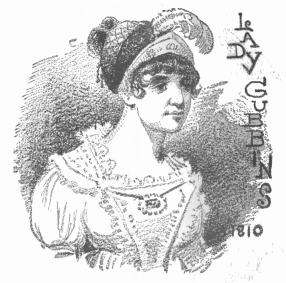
I cannot say much for the beauty of the drive, for one of those ever-to-be-expected April showers overtook us, and it was necessary to have the carriage-top put up. I was a little nervous from the start, at finding myself in such close quarters with Miss Featherstonhaugh, but really we progressed remarkably well. She had an idea that I was educated on the continent, and this served to excuse my ignorance of many English matters. I was careful, too, to observe due discretion, and to let her take the lead in conversation. At Rugby we had only a peep, through the driving rain, at the school which Dr. Arnold and Tom Brown have made so celebrated. I could not help thinking, as we made our entry into Coventry that if the weather, at the time Lady Godiva made her famous ride, at all resembled what we were enduring, the hard-hearted earl might have allowed her a waterproof, or at least an umbrella. By the way, they all call waterproofs ' mackintoshes,' and canes are ' walking-sticks.' I nearly exposed my Yankee origin by referring to his lordship's cane. He crushed me with " I'm not a tutor, you know.' It seems that rattans used for flogging, are the only articles which they call canes. We had considerable amusement discussing the term 'sending a person to Coventry'; which signifies 'declining further conversation,' or ' cutting another's acquaintance.' I had my own private opinion that I might wish the trip to Miss Featherstonhaugh, before our visit was over. We lunched at the ' King's Head,' and visited the Guildhall, with its fine carved roof, its tapestry, and armor.
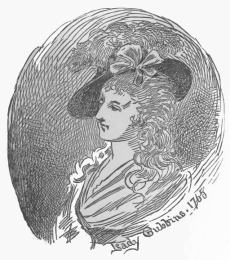
Then, the rain still pouring, we continued the journey to Gubbins Hail, a rather modern structure, in the midst of a beautiful old park. The mansion is older than it appears, and, among other interesting apartments, contains a private picture-gallery, with portraits by Gainsborough, and other artists of less note, of all the different Lords and Ladies Gubbins, from the time that the illustrious name received its patent of nobility. Some of the old-fashioned dresses were very comical. I would like to see Miss Featherstonhaugh in the costume of a Lady Gubbins of 1810. If you get up any tableaux at the Peak, try to persuade her to take that character. N. B. - You will need a feather-duster or so for the coiffure.
![Yellowplush [a servant] behind his Lordship's chair](vas-ch5-77-1x.jpg)
"As we entered the house, Lady Gubbins remarked that we would hardly have time to dress for dinner. I confess that I was a little disheartened, as I saw Miss Featherstonhaugh's boxes carried up-stairs, and remembered that my trunk had been sent on to London, and that I had only brought a large bag. However, that handbag can do wonders, as you know, and once in the privacy of my own apartment, the services of Lady Gubbins' maid declined, and my cloth pelisse laid aside, I took out my whisk-broom, and carefully brushed my faithful black silk. Then a bath freshened my spirits, and with my hair newly arranged with the silver stiletto, and the linked collar of silver medallions that Mrs. Arnold sent me from Florence, and the fichu of black Spanish lace that you bought for me at Madrid, fastened at the- waist with a bunch of fresh jonquilles, which I found upon my dressing-table, my spirits rose to the occasion, and I buttoned on my adjustable train, and drew my lace mitts over my elbows, with the feeling that Miss Featherstonhaugh might do her worst. The dinner was very formal, with 'Yellowplush ' behind ' his lordship's ' chair; and two hours spent at table, though there were no guests other than ourselves. After dinner we retired to the drawing-room, and Miss Featherstonhaugh and I played and sang alternately. She wore an India-muslin, with pale-blue trimmings, and looked glacial. She played selections from Handel, her favorite composer. I find that nearly all the English people whom I have met think that the 'Messiah' is the grandest composition ever written, and that nothing worthy of being called music has been produced since. I sang 'Now the Shades are Falling,' from Franz, which Lady Gubbins had never heard, though she has evidently been in society sufficiently to be familiar with an ordinary repertoire. Miss Featherstonhaugh then replied with two or three of the songs without words, evidently feeling that they were something quite new. They carried me back to the music-rooms at Vassar, and I remembered how I nearly came to hate them from hearing them practised day after day, on every side, with every degree of exactitude and inexactitude. Then they insisted on my taking the piano-stool again, and I gave them a bit from Wagner and one from Liszt. I could see that nobody cared for either selection. Miss Featherstonhaugh admitted that both composers were liked on the continent, and that English people who spent much time in Switzerland very generally grew to like Liszt. So you see that we did not agree at all, and yet, we each knew enough to respect the other's opinion; and through all, Barb., dear, I had an absurd feeling of how very alike we were. We were each of us a bit afraid of the other, and yet fully conscious of our own excellencies; we were outwardly constrained and dignified and inwardly timid. We touched upon poetry, and there we got along better, for Herrick, Motherwell, George Herbert, Shelley, and Keats are prime favorites with us both. Of moderns, she cares most for Edwin Arnold, and-Bryant!
'At the breakfast-table Lord Gubbins proposed that we should take a look at the stables, and regretted that it was not the hunting season or we should certainly have had a meet.
'"'Do you hunt? ' Miss Featherstonhaugh asked, looking directly at me.
" 'Oh, no indeed,' I exclaimed. ' I am a member of the Society for the Prevention of Cruelty to Animals.'
"'Yes?' she replied, in a doubtful way. 'Well, it does not seem quite fair, so many men, horses, and hounds, pitted against one fox; and to have the earth-stopper go around while the creature is out feeding, and close up every one of his holes, so that he may not be able to run to earth, is like engaging treachery to help the stronger side, which is quite at variance with our old English ideas of fair play.'
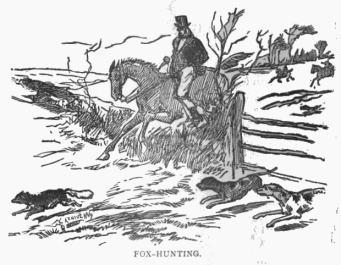
"'We do even worse things than that, you know,' Lord Gubbins added. ' My game-keeper bags as many foxes as he can during the season, so as to have two or three on hand whenever we have a mind for a hunt, then all we have to do is to have one let out behind a hedge, while the party is mounting, and we are sure of our game. No, it's not fair sport to the fox, but it's sufficiently exciting to the huntsmen and the hounds.'
" ' And it is a very pretty sight,' Miss Featherstonhaugh added. 'At least, Miss Boylston, you enjoy watching the red-coated riders sweeping along the level ground and leaping the bars, the green-liveried whippers-in, and the spotted hounds in full cry.'
"I was obliged to confess that I had never even witnessed a hunt; whereupon she gave me a wondering stare.
" ' Ah! you are city-bred,' she said, at last. ' Now, in the country, we are like the Ephesians, entirely given over to the worship of Diana, goddess of hunting.
"'Did you ever read an article by Charles Dudley Warner?' I asked (for I was so warmed up by the subject under discussion, that I entirely forgot the part I was to play), on ' Hunting, from the Deer's standpoint? '
"''No.' she replied. ' Did it appear in Blackwood?'
" ' In the " Atlantic," an American magazine,' I replied, with the pleasing consciousness that I had put my foot in it once more. My embarrassment was somewhat covered, however, by our rising from table and preparing for the visit to the stables.
" I cared very little for the horses, but the walk which followed across the park was delightful. The hawthorn was in blossom, and the air was filled with its delicious fragrance. The hedges, the grass, and the trees were all washed fresh by the recent rain, and the sunshine flashed brightly on the white swans swimming in a little lake. Lady Gubbins said she had heard a nightingale the evening before, and other birds were flying briskly about. I happened to mention Shakspeare's lines-
" ' The lark that tirra lirra chants,
With hey ! with hey! the thrush and the jay.'
" ' How fond he was of flowers, too,' Miss Featherstonhaugh remarked. ' I wonder how many of his favorites we shall find in bloom during the excursion which we are to make to Stratford-upon-Avon.'
" At luncheon Lord Gubbins ordered out the carriage. ' I shall drive to the station to meet an American young lady,' he said, ' who is to join us in our expedition to-morrow to Kenilworth, Warwick, and Stratford; and if you young ladies would enjoy a drive this afternoon I would be happy to have you accompany me.'
![Kenilworth Castle [ruins]](vas-ch5-80-allX.jpg)
" We each accepted, and then Miss Featherstonhaugh asked if the expected guest was by any chance the niece of Mr. Acherly Atchison, with whom she had played tennis, at Chatsworth. On being told that she was only a friend of hers, Miss Featherstonhaugh, much to my surprise, sang your praises.
" ' That Miss Atchison strikes me,' she said, ' as a most delightful . young person. I was prejudiced against her, but she has quite won my heart. Do you know, I really believe she gave me that game ? She was a very clever player, and her behavior impressed me most favorably.'
"When Maud arrived, Lord Gubbins introduced her to Miss Featherstonhaugh, but remarked: 'I believe you have already met Miss Boylston.'
""At Chatsworth,' Maud replied, with a demure little twinkle.
" But I was getting weary of the constant strain, and longed for some opportunity of disclosure. It came with our excursion of yesterday, which was one of the most interesting experiences of my life. We drove first to Kenilworth Castle, where Maud made a sketch, while we rambled. I had carried Walter Scott's Kenilworth with me, but it was very difficult to recognize localities, though Lord Gubbins was quite positive as to the former position of the " Tilt Yard,' the " Gallery Tower,' the " Pleasance.' the ' Sally-port,' and the ' Great Gatehouse.' I looked in vain for traces of " Mervyn's Tower,' in which the unfortunate Amy Robsart took refuge during her husband's reception to Queen Elizabeth. We read Robert Laneham's curious description of the merrymakings on this occasion, and tried to realize the scene with the maskers, the floating pageants on the lake, the din of the buffoons and minstrels, mingling with sounds of revelry, and the glare of hundreds of waxen torches upon the entry of the magnificent cavalcade of courtiers, led by the Queen, her powdered hair, her ruff, her brocade petticoat, and even her satin shoes blazing with jewels; while Leicester, her host, the handsomest and wickedest man in England, " glittered at her side like a golden image, with jewels and cloth-of-gold.'
![On the Road [quaint bridge]](vas-ch5-84-1X.jpg)
"If my researches as an antiquary were crowned with but indifferent success Maud had a charming field, for a more poetic ruin I have never seen.
" ' The hoary keep of Kenilworth,
How mournfully and drear, .
Its turrets from the crumbling mass,
Their broken forms uprear.
" ' The summits crowned with verdure green,
The wild moss creeping o'er,
Where floating in emblazoned sheen
The banner waved of yore.'
" It is only five miles from Kenilworth to Warwick, but the route abounds in so many picturesque views that Maud was constantly urging us to stop and let her sketch " this little bit.' I noticed a number of inns with such antiquated names as ' Rose and Crown,' ' The King's Arms,' ' The Spotted Dog,' and the ' Mermaid.'
" Near Warwick we turned to our left and followed an avenue of Scotch firs which led us to Guy's Cliff, the country seat of Lord Percy. The story of Earl Guy of Warwick is worthy of being added to the legends of Arthur's Table Round. It is said that ' Felys the Fayre,' who finally married this famous warrior Guy, in his wooing ' caused him, for her sake, to put himself in many greate distresses, dangers, and perils. . . . When they were wedded but a little season, considering what he had done for a woman's sake, Sir Guy thought to besset the other part of his lyf for Goddis' sake, and departed from her to her great hevynes, fighting menye greate Battells,' espousing always the cause of the injured party. At last, ' unknown savinge to the kinge only,' he retired as a hermit to this cliff, repairing daily to the Castle of Warwick to receive alms of his lady.
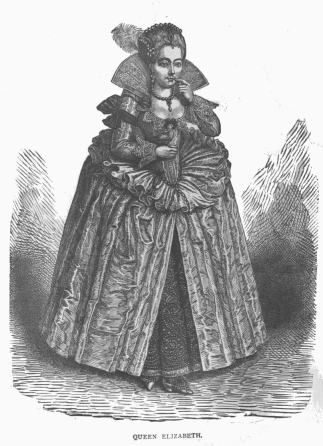
Only on his deathbed did he make himself known to her by sending her a ring. The legend adds that the countess survived him but a fortnight, and that they were both buried together.
" From Guy's Cliff we hurried on to Warwick Castle, for it is closed to visitors after four in the afternoon. We were fortunate in having an hour in which to explore its treasures. Maud could hardly be persuaded to enter, she was so intent on transferring one of the picturesque towers to her sketch-book. Although the castle has suffered severely by fire, it is still wonderfully rich in art and in costly furniture. The Vandycks especially excited Maud's enthusiasm, and I found the "work of Rubens and of Sir Joshua Reynolds extremely interesting. Next to the pictures we both voted the old armor most fascinating.
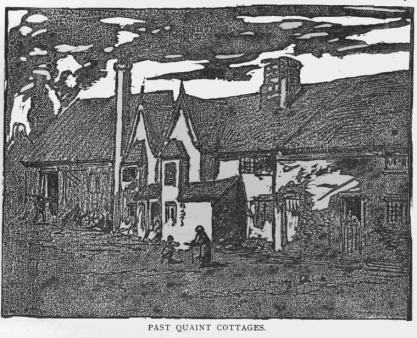
" After our visit at Warwick Castle we drove on for eight miles, past quaint cottages, and charming vistas, to Stratford-upon-Avon, where we spent the night at the ' Red Horse,' the inn where Irving lodged. In the evening we adjourned to Irving's room, and there read aloud his charming description of his stay here; and Miss Featherstonhaugh admitted that America had produced at least two prose writers, - Irving and Hawthorne.
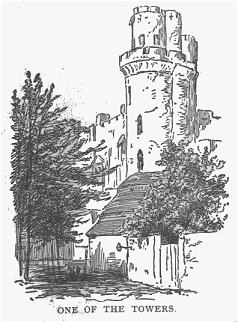
" It was here that I threw off the mask of a conspirator and came out in my true character as an American citizen. There was an old piano in the inn-parlor, and though it was wretchedly out of tune, Lady Gubbins insisted that Miss Featherstonhaugh and I should sing something suggested by our late visit to Warwick. Miss Featherstonhaugh gave us ' The Mistletoe Hung on the Castle Wall,' and I sang "Mid Pleasures and Palaces.'
" ' That song is to Americans what " Annie Laurie " is to us English,' Miss Featherstonhaugh remarked. ' I remember that my brother told me he should never forget the thrill which he once experienced on hearing " Annie Laurie " sung in a foreign land. I believe it happened in Spain when he was returning from India with you. Lord Gubbins and he ascertained afterward that the singer was one of the party of American girls of whom I spoke to you, and in whose description he was far more than extravagant. He said that they were girlishly enthusiastic; but then it was an enthusiasm schooled by a study of the liberal arts to critical appreciation, and not mere indiscriminate gush. And it struck him as such a pleasant thing that their superior advantages had not destroyed the capacity for admiration, but enabled them to express it the more frankly from the quiet conviction that they were capable of recognizing a good thing.'
" Lord Gubbins laughed at this speech until he fairly choked, and I could stand it no longer. ' Miss Featherstonhaugh,' I said, ' I feel like a culprit for permitting you to say so much, as I was probably one of the American girls of whom your brother spoke.'
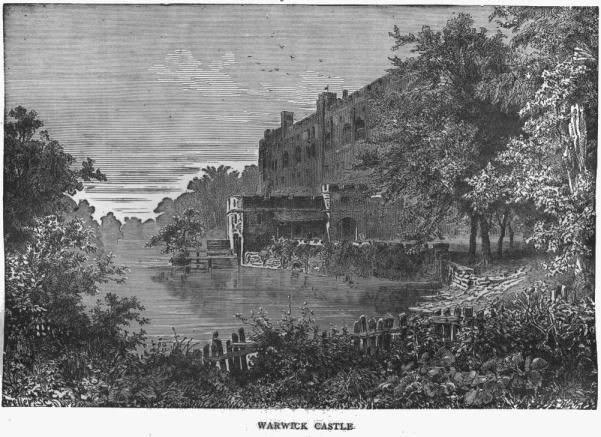
" You should have seen her expression. ' Impossible! ' she exclaimed. 'You are not in the least American, you have every English characteristic.'
" ' Come, now, Gladys,' Lady Gubbins asked, good-naturedly, ' You don't mean to say you have not suspected for some time past ? '
"'Not in the least; and you said you lived in Chelsea.'
" ' So I do,' I replied, ' Chelsea, Massachusetts, one of the suburbs of Boston.'
"Then Lord Gubbins burst into a hearty fit of laughter. 'Ah! Gladys,' he said, ' you have lost the Ascot. I vowed to take you to the races if you guessed our little game, but you are not so clever as I thought you.'
" She looked more and more bewildered. ' I have said dreadful things about America, I daresay, but you ought to forgive me under the circumstances.' Of course I told her that she had only been too complimentary, and we shook hands as good friends, though I do not believe in her heart of hearts she quite forgave me, or that she admires me at all as I do her. Really she belongs to a fine type of woman, a little bit out of the world, and with a pure, high scorn of society inanities, yet highly bred, and in her way as conventional as it is possible for a charitably-intentioned woman to be. She commands my highest respect, but I believe that you would get along with her better than 1. And though our experiment has been a success in the way of proving to her that American girls are not so very unlike their English cousins, I am positive that her heart has not been in the least interested by the specimen under her consideration.
" Our last day together was spent very pleasantly. Early in the morning we visited Shakspeare's birthplace. I send you some flowers from the garden for your collection - daffodils and violets, with sprigs of fennel and rosemary. You can easily match them with selections from his plays. We rode over to Shottery, and Maud made a drawing of Ann Hathaway's Cottage. We stood inside the huge, old-fashioned fireplace, and caught a glimpse of the sky through the broad-throated chimney, and rested ourselves on the settle where William and Ann must have often sat hand in hand in their wooing time. We made a short call too at Charlecote Park, where Lord Gubbins insisted Shakspeare never poached. Evidently a poacher conveys to his mind only the most vulgar of ideas. Our next visit was to the church containing Shakspeare's tomb, with the inscription which has frightened so many a resurrectionist: -
" Good friend, for Jesus' sake forbeare,
To dig the dust enclosed here.
Blessed be he that spares these stones,
And curst be he that moves my bones ! "
" Lastly, we paid our respects to the new Shakspeare Memorial Theatre, and we could not help regretting that we could not stop long enough to see here a representation of one of his plays. After our return to the hotel I sang two or three of the Shakspearian songs, which Schubert has set to music, -'Who is Sylvia,' and "Where the Bee Sucks.' Then came an early dinner, and our kind friends bade us bon voyage at the station, where Maud and I took the afternoon train for Oxford, our brains buzzing with all we had seen and enjoyed.
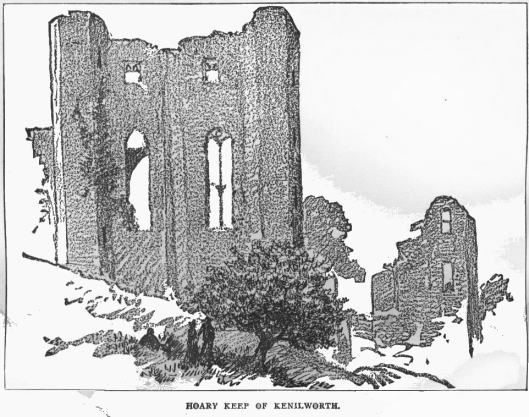
"Mr. Dick Atchison called on us this evening, and to-morrow he is to show us over the colleges. And you at the Peak, what are you doing and whom are you making happy with your merry, sunshiny ways? I am impatient to get to South Kensington, where I expect to find a long letter with a full description of your delightful country life.
Ever devotedly yours,
" CECILIA."
" And at Oxford," Barbara mused, " though she does not know it, she will probably meet John Featherstonhaugh."
Return to main page
Scanned by Deidre Johnson for her 19th-Century Girls' Series website; please do not use on other sites without permission



![Yellowplush [a servant] behind his Lordship's chair](vas-ch5-77-1x.jpg)

![Kenilworth Castle [ruins]](vas-ch5-80-allX.jpg)
![On the Road [quaint bridge]](vas-ch5-84-1X.jpg)




